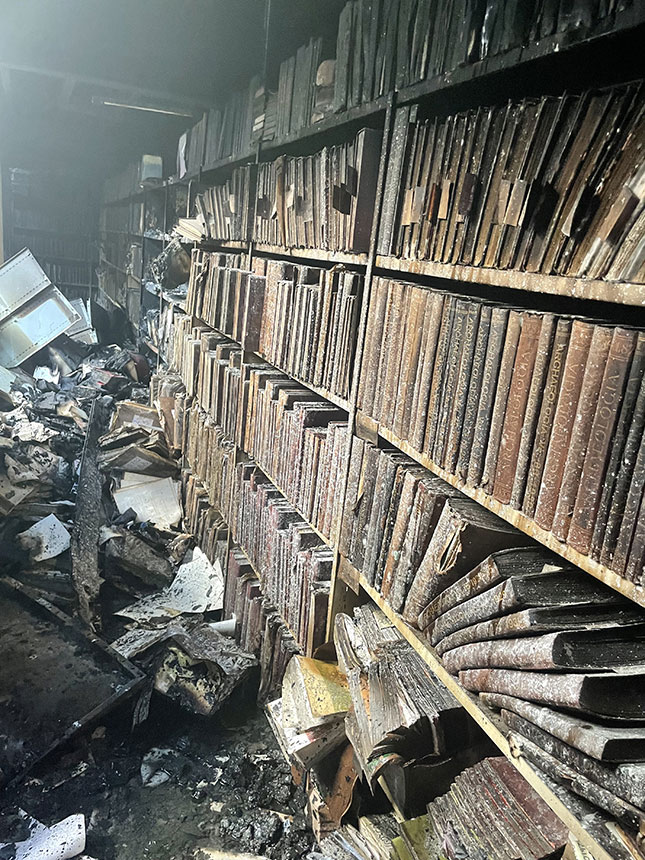About 30 miles from my home in England, deep in the Shropshire countryside, is the small and picturesque, but not very prosperous, town of Wem, where William Hazlitt, the great essayist, spent much of his early life, though I am told that the locals are not particularly proud of him, as few these days have heard of, let alone read, him.
On the night of October 6 last year, a terrible fire erupted in Wem, consuming the whole premises and stock of a business, Cosmo Books, owned by Robert Downie, with whom I had had some dealings in the past. Cosmo was an unusual bookseller, entirely online, specializing in articles taken from eighteenth- and nineteenth-century periodicals. Some 170,000 items were lost in the fire—undoubtedly caused by arson, not by lightning or electrical fault.
The bookseller was not the target of the arson. Behind his main premises—essentially a warehouse with an office attached—was another small unit, sublet not long before the fire to a group of people who turned out to be drug dealers. On the night of the fire, a person or persons drilled a hole in the door of the sublet and poured a fire-accelerant through it. The fire ripped through a part of the industrial estate, but it was Cosmo Books that suffered the worst devastation: other areas suffered only smoke damage. It took the fire department three days to extinguish the blaze completely.
Probably, though not certainly, a rival gang of drug dealers set the fire in revenge for some past violence, as a battle in a turf war, or as a way of reminding the occupants to pay a debt. Though small, poky, and with permanently boarded-up windows, the location had served as a venue for parties, perhaps tending to orgy, complete with a bar and beds and couches.
A few days later, after a display of inertia that we now expect of our police, a search turned up weapons at the site: coshes, knives, and a sword. Also found was a box containing about $250,000 worth of cocaine. Theft seems not to have been among the arsonists’ motives, unless so much cocaine was already stored there (and taken) that they simply overlooked so trifling a quantity.
It subsequently emerged, at least in rumor, that the new tenants of the small property had set up security cameras, not to protect them from crime but from agents of the law or other gangs. They often posted lookouts on the industrial estate to warn them of the approach of the police or their rivals. Naturally, they had more to fear from their rivals than from the police; and the tenants have now disappeared without a trace. At any rate, no one has yet been caught or charged, and no one is holding his breath until someone is. My guess is that the intended victims and the culprit gang may indeed be caught one day, but more by luck than by judgment or detective work. If either group had done something really serious—utter a misogynistic remark, say—they would by now have found themselves, as prison argot puts it, “banged to rights.” As it is, they will probably continue their activities unmolested by police for some time.
After the fire had ruined Downie’s stock almost entirely (by a kind of miracle that reminded me of the famous photograph of the survival of St. Paul’s Cathedral during the Blitz, an exquisitely bound copy of a small book, Poetry of the Anti-Jacobin, remained unharmed, though the padded envelope that stored it was thoroughly charred), he informed his customers via e-mail of the disaster and received in return many messages of condolence and offers of help. I decided to pay him a visit.
Aged 60, with a resilience and good humor that I do not think I should have been capable of in such circumstances, Downie had almost immediately started to trade again from a temporary office near his old location. His stock had taken him decades to collect, collate, and catalog. One could not simply reconstitute it by sending one or two orders to suppliers. It was more like a life’s work, and 60 is not usually an age when one begins again.
But Downie said something that struck me as wiser than anything that an army of therapists might have managed to articulate. Yes, he was a victim, he said (and none more innocent), but he was not going to victimize himself a second time by brooding endlessly on his calamity, and thereby turning himself into a bitter old man. Moreover—though, in a sense, he had to start again from scratch—he knew his business thoroughly, and the fire had not cost him his knowledge.
Of course, so wise an attitude did not preclude anger at what had happened, or rather—as he soon discovered—at what had been done. He recalled his arrival at his business the following morning—someone had informed him by telephone that a fire had broken out on the industrial estate, but he did not believe that it was at his premises—to see the blaze still raging, and he knew at once that his work of decades was lost. An articulate man, he was at a loss for words to describe his emotions at that moment. To adapt Wordsworth slightly:
To him the local fire that burns can give
Thoughts that do often lie too deep for tears.
He was angry on several fronts: at the actual fire-setters, naturally, though they were unknown to him; at the drug-dealing tenants of the adjoining unit, but also at the person who sublet to them, probably illegally; at the owner’s agent, who did not supervise the property for which he had responsibility; at the distant owners of the site, who were indifferent to what had happened; and, finally, at the police, who had not bothered to interview him. As readers of detective novels know, and common sense dictates, he who is most directly affected by a crime should be questioned as soon as possible. After all, the arson might have been targeting him; he might have known something about the subtenants of the premises in which the fire had started; he might even have contracted for the fire himself, for what is known in arsonists’ circles as an insurance job. The fact that the police had asked him nothing removed any confidence that they were trying to find the culprits of what was a serious crime, and which might even have ended in fatalities. They fiddled while Wem burned.
Downie said that he might have a legal claim against the tenant, or the managing agent of the premises, or the managers of the whole site and the owners—but even if he did, he would probably not pursue it far. It would cost much and yield little, even if legal liability could be fixed on any of the parties. I gave him the benefit of my experience of civil actions in a medical context—admittedly, only as a witness; but I have observed that such processes continue for years and come to obsess the plaintiffs until they can think of nothing else. And finally, when the case settles, the plaintiffs still feel that justice has not been done, that the wrong verdict was reached or the compensation was insufficient, that the defendants got off lightly, and that the whole legal system was corruptly biased against such as they. I have never met a happy plaintiff, except those who won and whose claim was fraudulent.
Yet when I visited the burned-out warehouse in Downie’s company, my first thought, after the shock and pity of it, was of vengeance upon those who did such a thing: and it was not even my life’s work that was so wantonly destroyed. The ground was a black, tar-like mass of carbon mud. On the shelves that remained were carbonized books, completely irrecoverable and many irreplaceable, glued together by water from the firefighters’ hoses. More than half a mile of books and papers, carefully cataloged at the expense of thousands of hours of work, were no more. The roof had caved in; the wooden beams were charcoal. A glance was enough to make one despair.

Downie started as a bookseller when he was a teenager. His father, a successful car salesman, did not want him to continue his education, and Downie was too young to oppose his father’s wishes. His mother ran two small secondhand bookshops in provincial towns, and the young Downie worked in them during his school holidays. Then, when he was 16 and had left school, his father drove him to one of them, dropped him off, and said, “There, you manage it.” And he did, until he was 18, when he bought it from his mother with a bank loan that his father guaranteed. He ran it for another decade, before selling it.
By then, Downie had grown tired of direct contact with the general public. People entering his bookshop would treat him as if he worked for a tourist information office or ask him whether he had any cigarettes for sale. He decided thenceforward to do only mail-order selling of real antiquarian books from catalogs. In any case, traditional bookselling from small shops was soon almost to die out.
He had an illumination one day while looking through a large volume of old Acts of Parliament. Who would want such a volume? On the other hand, people with a particular interest in a subject might want a single Act for their collection or research. (By the time of the fire, Downie had amassed what was probably the world’s largest private collection of Acts of Parliament, from the seventeenth to the nineteenth centuries.) The idea came to him to break each volume into its component parts and sell each item individually. A natural extension of this idea, which proved successful, was to split up the many journals of the eighteenth and nineteenth centuries, which contained numerous essays of historical and intellectual importance, and sell them article by article. The coming of the Internet expanded the reach of his business immensely.
I asked whether he ever had any qualms about separating old volumes of journals and magazines, and he replied with what, to me, came as a surprisingly unequivocal negative. He would not break up a beautiful, precious, or rare book, he said (in fact, many such books have been wrecked for their illustrative plates by avaricious booksellers), but he was making available to the public what it might otherwise not know existed and would otherwise molder on shelves for another 100 or 200 years. And people who might otherwise search fruitlessly for material on whatever was their interest, but who did not want large volumes of mostly extraneous matter cluttering up their homes, could now find it with a few touches of a keyboard.
He was right: I had once bought from him a two-page paper by Charles Loudon, in whom I happened to be interested. Loudon was a Scottish doctor who practiced in Leamington Spa, a town about 50 miles from where I live, in another direction from Wem. Leamington Spa’s spring waters were believed in the nineteenth century to be curative, and the town soon became an elegant and aristocratic resort. Loudon wrote a book about those supposedly curative waters, which went through three editions, taking the unfashionable, and probably not locally well-received, view that they were no panacea. He was appointed to the Royal Commission on the use of child labor in factories in 1833 and quoted by Friedrich Engels in his Condition of the Working Class in England in 1845. In 1841, Loudon retired to Paris, where he wrote (in French) a book trying to refute the population theories of Thomas Malthus—an interesting career. His first publication was about an obscure ear disease, published in an equally obscure Glasgow medical journal of the 1820s, and it was this that I bought, more for the sake of its author than its subject matter. Without Downie’s business, I would never have known of its existence, nor would I have bought the complete volume of the journal that contained it if I had ever found it.
“A perfect illustration,” said Downie.
The Wem fire was illustrative in more than one respect. The day before I went to see Downie, I was involved in a debate about drug legalization. One of the arguments in favor of such legalization, put forward by a reasonable person, was that prohibiting any drug that people might want to take created a black market that promoted and gave opportunity to criminality.
I have sometimes flirted with this thought myself. But does opportunity create criminals, or do criminals create opportunity? Suppose that cocaine were not a trafficked commodity, but instead on sale legally, like alcohol. Would the destroyers of Downie’s stock have then become decent, upstanding citizens, or would they, rather, have turned their attention to some other illegal activity?
The fire and its aftermath also exemplified what everyone already knows: the almost-programmed incompetence of the police. No one to whom I related the failure of the police even to question Downie was surprised: years of criticism and reform have left the police demoralized and intellectually and morally corrupted. They hardly know what they exist for these days, or if they do know, they nevertheless choose to concentrate on safer and less taxing trivialities, such as the investigation of so-called hate speech rather than the detection of real crime. The formalization of all their procedures, the constant resort to pen-pushing and form-filling, discourages flexibility and powers of discretion and has ruined even their individual intelligence, for what is not used habitually withers and decays. Even their appearance has changed, from that of a citizen in an unthreatening uniform to that of a paramilitary wing of a violent fascist movement. Only the fact that so many of them are patently unfit and could hardly chase an old lady with a walker very far prevents them from being truly fearful, festooned as they now are around the waist with the encumbering apparatus of repression—truncheon, handcuffs, gas canisters, and sprays of various descriptions. They are, and probably at some level of their psyche know themselves to be, part of an elaborate charade, in which they bully the innocent and ignore the guilty—especially the dangerous.
The inefficacy of the police is not merely an inconvenience, though it is certainly that, as well. It indicates that the government and its associated administration, which have for decades mandated, and presided over, a depressing degeneration of law enforcement, are unaware that the maintenance of order is not merely one of their tasks among others—such as ensuring that people are protected from the way others might happen to address them—but the very justification of their existence. Criminal disorder saps their legitimacy, which, in turn, leads to further disorder.
The fire was a powerful reminder of the baleful effect of crime upon its victims—an effect that I confronted practically every day of my professional life, though I found that many educated middle-class people were reluctant to hear about it, so anxious were they to display their theoretical compassion toward the perpetrators and never grasping the point that it was the poor, not the rich, who were the principal victims of crime.
It takes no great imagination to apprehend the emotions of a man whose life’s work has been casually destroyed by a vicious gang, thousands of hours of labor set at naught, and what effect it might have had were he a lesser person. But Downie understood something that is seldom understood, or at least not much emphasized, in our current climate of opinion, in which vulnerability and fragility are what is admired and encouraged: that while emotion is important, and without it nothing would matter, it is not all-important, not the only guide to action. Emotion must be tempered by thought and rational reflection, which, by confronting the situation constructively, helps limit its destructive effects. Of course, many factors aided Downie’s admirable response: intelligence not the least of them, but also the fact that he was sufficiently insured to tide him over, and the fact of his indestructible knowledge of his endlessly interesting business. He claimed no great merit for his resilience, since, he said, he had little choice but to be resilient. You do not enter a business such as his to make a great fortune, and he was too young to retire. He still had his livelihood to make. But many people in his circumstances would have been crushed or sought other ways of rising from the ashes, such as psychotherapy or legal action—both damaging, in such instances, to the human personality.
How we respond to circumstances is generally a choice, admirable or otherwise. I admired this bibliographical phoenix rising from the flames, and recently bought a few more items from his swiftly resuscitating business: one an essay from 1797 on women’s depravity caused by reading novels, the other an engraving of Protestant martyrs burned at the stake.
Top Photo: Robert Downie’s Cosmo Books, in Wem, England, a provider of rare and scholarly manuscripts (Courtesy of Cosmo Books (2))






